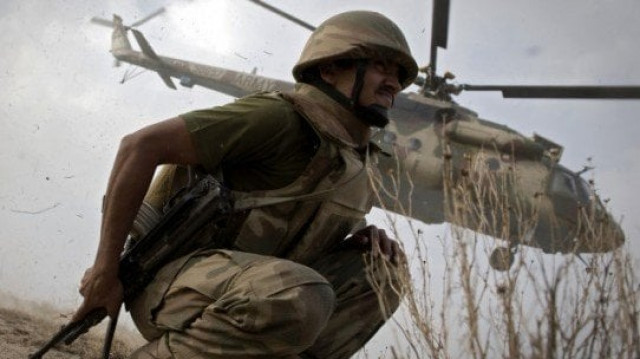Fight against militancy: still long way to go
The Taliban have been weakened but not defeated even in those areas where the military has claimed victories against them.

When the young, ferocious Hakimullah Mehsud, the chief of the outlawed Tehrik-e-Taliban Pakistan (TTP) and successor of Baitullah Mehsud “died” of wounds he sustained in a missile strike by a US pilot-less aircraft in South Waziristan Agency in January this year, a top security analyst was asked about its impact on the Taliban insurgency. “It’s a matter of days now. The Taliban will be wiped out,” he said. One wishes he were right. But he wasn’t. It was wishful thinking because even Mehsud later “resurrected” to mock official claim of his death. Last year, the government ordered thousands of troops, backed by heavy artillery and air power, into South Waziristan to defeat the TTP in its bastion. Surprisingly, the troops didn’t face much resistance as was feared. And they overran bases after bases of militants in the craggy mountainous region in the next few months. Earlier this month the top military commander in the region, Major-General Nawaz Khan, told journalists in the neighbouring district of Karak that peace has been restored in the region and it was safe for thousands of tribesmen displaced by fighting to return to their homes. But Saturday’s in-synch attacks by marauding Taliban guerillas on security posts were, perhaps, a message from insurgents that it’s far from over. Six soldiers died in these attacks. And if one is to believe official claim 32 rebels were also killed in retaliatory fire.
While still engaged in Waziristan, security forces opened another front in the Orakzai tribal region, the only of seven tribal agencies which doesn’t share a border with Afghanistan, following intelligence that insurgents were regrouping in the region after their defeat in Waziristan. In March this year, thousands of paramilitary troops launched a ground offensive in the region, once under the command of Mehsud. After over three months of fighting, the military announced “victory” against militants. However, it was a premature announcement and the military later clarified that only “major operations” were over and that “stabilization operations” would continue. For how long, nobody can say for sure because residents say militants are still in control of large swathes of land in the north of the agency.
In the neighbouring Kurram Agency, which has been wrecked by Shia-Sunni strife over the past few years, security forces claimed earlier this month that they have flushed out Sunni militants backed by the Taliban from 80 per cent of the region. And that the Thall-Parachinar-Sadda highway, the only road link between Kurram Agency and the rest of the country, has been reopened for traffic after a hiatus of over two and a half years. They even took a select group of journalists on a tour to the region to show them their gains. But on Saturday militants ambushed a passenger bus travelling from Parachinar to Peshawar in the eastern Afghan province of Paktia, killing 12 Shia tribesmen. Travellers often take long detours into Afghanistan instead of travelling on the perilous shorter route of Thall-Parachinar-Sadda. One would ask if it was safe to travel on this shorter route, why the tribesmen took a long detour into Afghanistan.
In Swat district, once reeling under a bloody rebellion led by hard-line cleric Maulana Fazlullah, security forces claim to have regained full control of the picturesque region after a major operation last year. To regain the confidence of local population, they organised a festival last month featuring secular events like singing and folk dances, etc, that Fazlullah’s loyalists were opposed to. But sporadic violence continues unabated. Earlier this month, militants attacked a security checkpoint on the border between Mohmand tribal region and Bajaur agency which borders Dir district, once the headquarters of the Tehrik-i-Nifaz-i-Shariat-i-Muhammadi (TNSM) of the frail octogenarian cleric, Maulana Sufi Muhammad,. Over 50 paramilitary troops went missing. Fifteen of them strayed across the border into Afghanistan and were subsequently handed over to Pakistani authorities. Five were killed and a militant spokesperson claimed that they had seized 33 troops, offering to swap them with their colleagues in jails. Nothing has been heard about them ever since. Friday’s twin suicide bombings in a busy market in Mohmand Agency were another gruesome reminder that it would take years if not decades to banish militancy. Over 100 people were killed in synchronized bombings outside the office of a top government official where a tribal jirga was convened to garner local support against militants. The TTP claimed responsibility for the attack, warning that anybody siding with the government would face a similar fate.
This sudden surge in violence after a brief lull indicates that militancy refuses to die an easy death and that insurgents are fighting back. It also shows that fighting these obscurantist elements needs patience, perseverance and steely nerves. And that instead of making premature claims of victory, we should fight this long war, no matter how painful it is, with a focused and pragmatic approach.
Published in The Express Tribune, July 12th, 2010.



















COMMENTS
Comments are moderated and generally will be posted if they are on-topic and not abusive.
For more information, please see our Comments FAQ